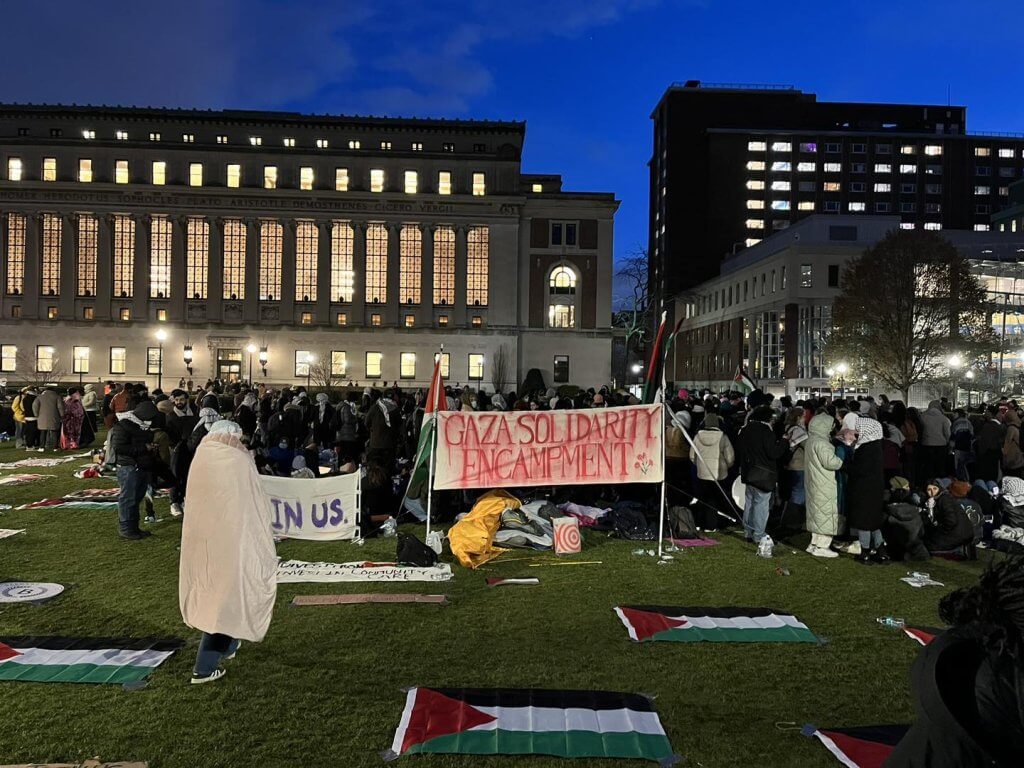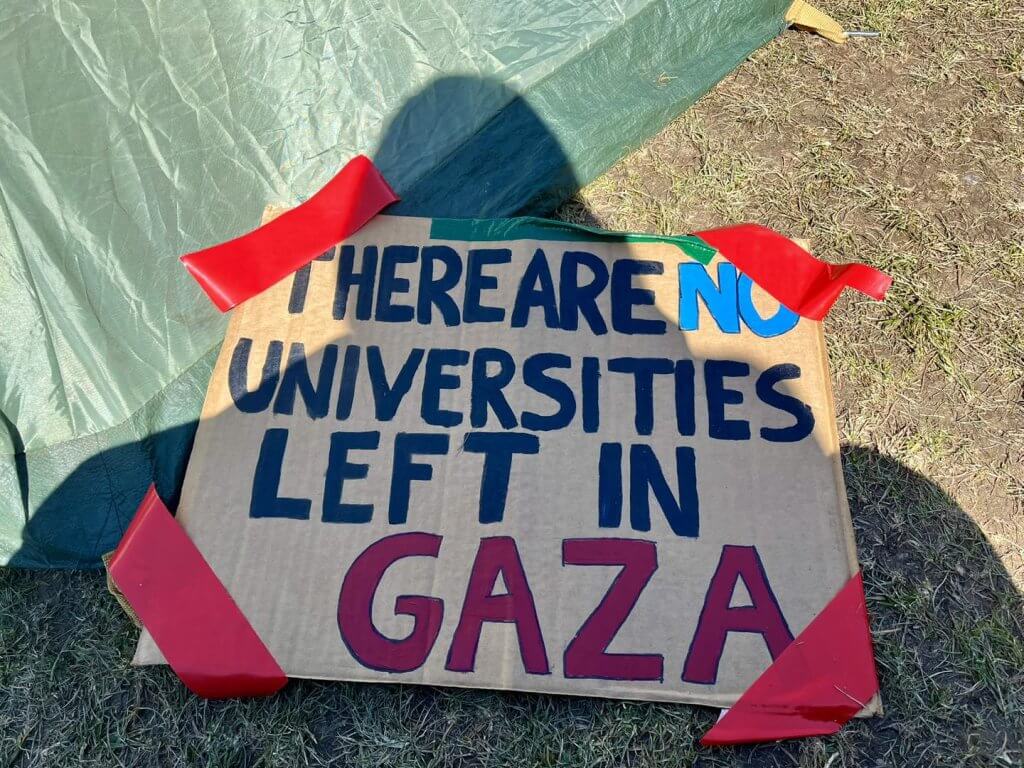‘I’ve never seen anything like this momentum before’: a Columbia student organizer on the Gaza Solidarity Encampment
An student organizer with Columbia’s Gaza Solidarity Encampment talks to Mondoweiss about the importance of centering Palestine, the campus movement exploding across the U.S., and what happens next.

One week ago hundreds of students at Columbia University set up Solidarity Encampment to protest the school’s connection to Israel’s war on Gaza.
In recent days students have been suspended and arrested, while pro-Israel groups have pushed for the National Guard or the NYPD to shut the protest down. The movement has also spread across the country. MIT, Tufts, Emerson College, NYU, The New School, the University of Michigan, Washington University in St. Louis, Vanderbilt University, Brown, USC, and the University of North Carolina are just some of the schools where students have erected their own encampments in solidarity with Gaza.
Mondoweiss spoke with Maryam Iqbal, a first-year student at Barnard College and student organizer with Columbia’s Students for Justice in Palestine (SJP) chapter about the mood on campus, the protests, and what happens next.
Mondoweiss: We’re seeing a lot of stories about the Columbia encampments, but people do not know some of the backstory here, dating back to the fall when the Students for Justice in Palestine (SJP) and Jewish Voice for Peace (JVP) chapters were suspended at the school. Can you talk about the climate on campus leading up to these most recent protests?
Maryam Iqbal: Yeah, for sure. So, prior to October, there really was no SJP on campus. There was an SJP Instagram, and I would DM them occasionally, trying to join, but there was just no activity. I went to the club fair in September and SJP wasn’t even there. I remember JVP was taking signatures for an SJP, and then in October, when everything started, SJP became a movement on campus.
We had our first protest on October 12 and the numbers were insane. We didn’t expect it at all. There were hundreds of people showing up for Palestine and we would protest consistently, up to the point of suspension. The majority of our threats were external, Zionist organizations such as the guys behind the doxing trucks. Our main concern actually used to be doxing, but by November we started getting a lot more disciplinary threats from the administration regarding “unsanctioned protests.”
I believe the administration realized we weren’t going to stop protesting as they had hoped so that led up to the suspension of SJP and JVP. They were allegedly suspended for not complying with the rules for booking a protest enough days in advance, which we had explained to the administration was an unreasonable demand considering the urgency. There was a genocide happening.
Once SJP and JVP were suspended, there was a lot of outcry from the student body. It really galvanized the student body, and that caused a coalition to form. Actually, re-form because Columbia University Apartheid Divest (CUAD) existed prior to October, but the issue wasn’t being talked about.
Now, we have a coalition of more than 120 student organizations at Columbia who are all in solidarity with a fight for Palestinian liberation. Since those suspensions, we’ve had protests, teach-ins, and all of these different events, but it’s been very difficult because of an administrative crackdown on us.
What do you think about the mainstream media’s coverage of the recent protest?
I think it’s really frustrating to see, especially the hyper-fixation on campus safety. That’s been something that has been at the front of all these conversations for the last few months and that’s the reason that I have been avoiding speaking to media up till now. I don’t like talking about campus safety when there are no universities left in Gaza.
I don’t want to center myself, or any college student for that matter, because it’s nothing compared to what’s happening in Palestine, and I think it’s a huge distraction.
Right now, looking at the media there’s a lot of mischaracterizing about what the encampment is. They’re making it sound like a battleground, the way they’re describing it. However, when you go there it’s very peaceful. They’re characterizing us as very antisemitic, but we’re celebrating Jewish holidays on the encampment with our Jewish comrades. So it’s just very misleading how they’re portraying the encampment.
Another thing that’s really frustrating to me is the way in which Western media outlets have been reporting on the encampment itself but without reporting on our demands or on the genocide that we are protesting. Obviously, we’re protesting for a reason. We’re not just causing a disruption for the fun of it. It’s been really upsetting to see this focus on just this hyper-fixation on elite college campuses over the actual atrocities happening in Palestine.

Can you talk a little bit more about the coalition that is engaged in this encampment? You mentioned that you’ve been celebrating Jewish holidays and traditions, but there have been consistent accusations of antisemitism that have become the central focus of anti-Palestinian opposition groups.
I would actually say that Jewish students are disproportionately represented in our encampment. JVP and Jews for a Ceasefire. Those are two organizations of anti-Zionist Jewish students and they have both shown out in such huge numbers to our encampment. I think it’s just very deeply insulting to them to be erasing their participation in this encampment.
It’s so central to the encampment. Ever since October SJP and JVP have been working in complete coalition. SJP doesn’t do anything without JVP, we fully work together.
When the coalition formed, we introduced all these other groups like the black student organizations, the Muslim student organizations, and all of these other groups, but from the very start, it’s been SJP and JVP.
What are the specific demands that this encampment protest has given to the Columbia administration?
We’re occupying the lawn until divestment happens because all of our protests from the very start have had the demand for divestment. Divestment from Zionist institutions, ending the dual degree program with Tel Aviv University, and canceling the opening of the Tel Aviv Global Center. This is all encompassed in our demand for a divestment.
What have you thought about the administration’s reaction to all this?
It’s been shocking honestly.
I’ve faced so much administrative repression for the last few months. I’ve been specifically targeted by both the Barnard and Columbia administrations. I think what was shocking to me is they don’t learn from their mistakes. When they do these things to suppress students, it only galvanizes the student body even more.
So, for example, if I were a Zionist administrator, I would not call the cops on my own students because I know that would cause mass outrage in the student body and spark a new movement. This is what happened when they suspended SJP and JVP. It revitalized the student movement.
I fully expected a crackdown, but I am surprised they don’t learn from their mistakes.
We’ve also seen these videos on social media of pro-Israel individuals trying to provoke reactions from protesters. There’s this assistant professor Shai Davidai, who has become infamous. Have you encountered any of that?
There have been a lot of people trying to provoke things and instigate, but I really feel like student organizers have done a good job of not getting involved in that kind of stuff.
The problem is everything gets pinned on us regardless of whether or not we were involved in it, but we have a very strict policy of not engaging with instigators.
What do you think about these encampments spreading across other U.S. campuses?
I think it’s just so beautiful to see. I don’t think I expected this much to happen.
I was arrested for protesting and I remember the the night I got out of jail I was trying to process everything and someone comes up to me saying they occupied the other lawn. I was shocked because when the arrests happened, all of the core student organizers had been taken to jail, and for the last few months, it felt like we had had to put so much work into keeping the momentum for the students.
For example, we would advertise a protest days in advance with a nice, pretty graphic so people would show up, but when we got arrested, they were able to organize their own thing on the spot.
I’ve never seen anything like this momentum before and I don’t think it’ll end until divestment actually happens at every university that is involved in this.
Can you talk about your arrest?
The morning before the arrest happened I was suspended along with two other students. When we got arrested, we were zip-tied, put into vans, and we spent some time in jail. It was all kind of a blur, I don’t really remember much of it, but then after we got out, people started getting a lot of suspension notices from Barnard specifically, and Columbia students started getting suspension notifications when they went to retrieve their belongings that had been confiscated by public safety.
I think they were using our belongings as a way to identify students so they would show up and they could immediately suspend them. There’s been a lot of underhanded, insidious tactics like that that that they’ve been using to get people.
I knew that I would be targeted at a more disproportionate level because the Barnard administration has been targeting me for the last few months. Me specifically as a member of SJP.
So, for example, Barnard students got conduct notices and most of us are being granted amnesty. They can just accept disciplinary probation as opposed to just getting suspended. I was one of four people who did not get that option and that’s what I expected to happen because I think that they have been consistently targeting me a lot.
They made a “No Entry” poster targeting me that basically uses my face as a mugshot. When I went back to the school after getting out of jail and tried to get back in, they treated me like a criminal. For a whole hour, I stood outside. It was midnight. Then they finally let me in and they timed me for 15 minutes on the phone. The second the timer went off I had to leave and find my own housing.
Are you are you in a safe place now?
Yeah, I did have to leave town because, unfortunately, there’s a lot of focus on me, specifically in the news. So it’s been difficult because of physical threats of violence.
I was trying to stay around Columbia as long as I could, but I was being physically stalked and recorded by outside Zionists, who I assume had been brought in through Shai Davidai’s tweets.
Are you still involved in the organizing?
I’ve been very involved in organizing still, and I’m doing a lot of press stuff right now and handling communications basically for SJP. I do plan on going back, obviously, because I do have a conduct hearing on this on Friday, and it’s in-person, and I’m required to attend.
What’s next for the Columbia encampment?
I honestly have no idea where it’s going because I didn’t even expect it to last this long. I Really thought we would get swept the first day. I didn’t expect this momentum to last. I have very strong faith that we will win our demands from this.
I don’t know how long it’ll take but I don’t think students are going to let up anytime soon.
Michael Arria
Michael Arria is the U.S. correspondent for Mondoweiss. Follow him on Twitter at @michaelarria.


No comments:
Post a Comment